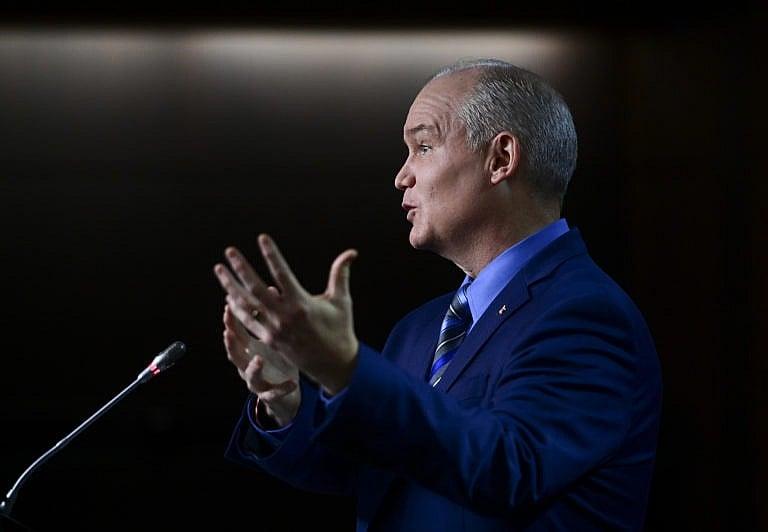Erin O’Toole starts to define his conservatism
Paul Wells: At least the Conservative leader said what many in his party believe, which is that the party’s days as a Stephen Harper cargo cult need to end

O’Toole holds a press conference on Parliament Hill on March 2, 2021 (Sean Kilpatrick/CP)
Share
At least now we know Erin O’Toole prepares seriously for serious moments. That’s already a kind of victory, or another defeat avoided. The Conservative leader showed up to the party’s national convention with a speech that said real things and delivered it well, in the carefully-rehearsed I-will-now-walk-casually-back-and-forth-on-the-stage manner that probably suggests spontaneity to anyone who has never seen a real person walk casually back and forth. As far as delivery goes, it may well be enough: in an election campaign that could start any time, he’ll face Justin Trudeau, who seems to have spent a half-decade working to eliminate any spontaneity he ever possessed.
As for substance, well, here too there were modest, decent surprises. “Our party has to change,” O’Toole said. It was the third sentence in his text. And then, in French, the fifth sentence. He could have pretended, or believed, it doesn’t have to change. He could have tried to change it while denying that’s what he was doing. Instead he was reasonably frank.
And when O’Toole says things like, “We have lost two elections in five-and-a-half years. In that time, we have had four leaders. We must present new ideas, not make the same arguments hoping that maybe this time more Canadians will come around to our position,” he actually has a lot of support within the party. This week I chatted with some of the people who were closest to Stephen Harper in 2006. They have no confidence that the winning playbook of 2006 and 2008 and 2011 has any juice left in it. It was, after all, the losing playbook of 2015 and 2019. They’ve seen how the party hit a wall in Ontario less than two years ago. Perhaps they’ve seen analyses like this one from David Coletto of Abacus, which shows that the people who’d consider voting Conservative but don’t yet plan to do so are younger, from more diverse backgrounds, more preoccupied with climate change and less angry at Trudeau than people who already plan to vote Conservative for a sixth or seventh consecutive election.
So that’s the good news. O’Toole recognizes the problem. Building a consensus around his preferred set of solutions will be trickier. The Canada’s Recovery Plan he described was light on calories. Its first plank is jobs. At last, a politician who’s in favour of jobs. Then comes accountability, support for mental health, a detailed plan to avoid a future iteration of the massive public-health crisis we’re all still living through, and a long slow path back to budget balance.
It wasn’t very detailed, which struck me as appropriate: a policy convention shouldn’t be leader-driven, or at least not too blatantly, and if O’Toole had to make a strong statement at this one it’s because he’s made so few in the weeks leading up to it. But even what he did say left plenty of room for potential trouble. He mentioned the terrible increase in opioid deaths in British Columbia last year. What he didn’t say was anything like what he’s said recently, that part of the solution might be lighter penalties for hard-drug possession. That policy would put him sharply at odds with 15 years of Conservative drug policy, and while I think it would bring him closer to a responsible policy, I really wonder what Conservatives who bought the previous line for 15 years will think of it.
Same with budget balance: even a decade-long path to balance will still require spending cuts, and the Liberals and NDP would be sure to run against those cuts.
What was most striking, from the guy demanding change of other Conservatives, was how little he still wants to say about climate policy. “To those who were expecting a dramatic moment: I’m afraid you’ll be disappointed!” he said. Good thing nobody was expecting that. O’Toole said “the debate” over climate change “is over,” neglecting to add that the latest instalment in the debate had taken place only a few hours earlier at this very convention. He wants to fix it, but with no cost to “working families” and “the little guy,” the latter a reference to François-Philippe Champagne if I’m not mistaken. He promises a “credible, serious alternative” to Trudeau’s carbon tax. I heard nothing in this speech that makes me believe he’ll have one to offer.
At least the Conservative leader said what many in his party believe, which is that the party’s days as a Harper cargo cult need to end. The Liberals’ polling advantage over the Conservatives is no larger than gaps many challengers have managed to close in many previous campaigns. Hope, more than any clear plan, is what’s keeping Conservatives even sort-of united now. The leader gave them a few more reasons to cling to that hope. A down payment on all the work that still lies ahead for him.